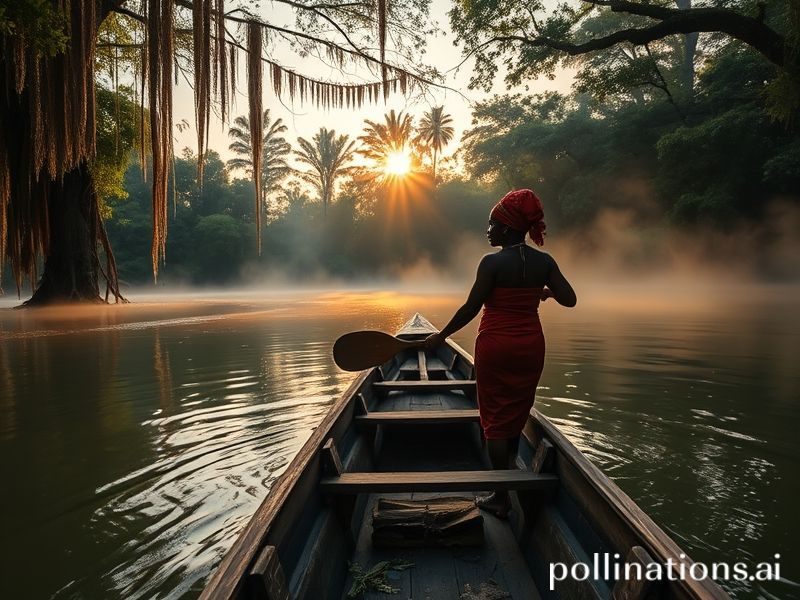Suriname: The Carbon-Negative Nation Too Broke to Brag About It
Paramaribo, Suriname – If the planet ever needed a cautionary tale about the seductive power of forgetting, it could do worse than this sliver of equatorial rainforest wedged between the Atlantic and three countries that pretend it isn’t there. Roughly the size of Georgia (the U.S. one, not the Caucasian one everybody suddenly remembers when gas prices spike), Suriname drifts through international headlines like an afterthought that owes everyone money yet still gets invited to the party because the music is better in its backyard.
From the vantage point of Davos, Suriname is a footnote in sovereign-debt spreadsheets—$3 billion in default, give or take a missed coupon—yet in Beijing it’s a strategic lithium and bauxite ATM with palm trees. The Chinese call it “kuanguo,” loosely translated as “the country we visit when we need aluminum and a UN vote.” The IMF calls it “patient.” The locals, when they aren’t busy surviving 60-percent inflation, call it home.
Global significance? Picture a green lung the size of England storing more carbon per hectare than the EU’s entire fleet of Teslas, while being strip-mined to keep German wind turbines whirring. Suriname is the first carbon-negative country on paper, a claim Brussels applauds with one hand while signing import licenses with the other. The joke is that the carbon is only negative because the population is small enough to fit into a medium-sized football stadium—preferably one built with laundered gold money.
Speaking of which, the gold sector is a masterclass in post-colonial efficiency: Brazilian garimpeiros supply the mercury, Surinamese generals supply the blind eye, and Dubai refineries supply the receipts. The resulting bullion ends up wrapped around the wrists of influencers who think “artisanal” means “ethical.” Meanwhile, satellite images show the rainforest bleeding orange scars like a teenager who discovered self-harm on TikTok.
Geopolitically, Suriname is the kid in gym class picked last for dodgeball but first for rare-earth poker. The United States remembers it exists whenever a Chinese survey ship docks; France eyes it nervously from across the Maroni River, calculating whether another département d’outre-mer might ease Paris pension riots. Brazil mostly wonders if the cocaine jets can refuel without bothering the macaws.
Yet the real plot twist is philosophical. Suriname is what happens when a society tries to reconcile 17th-century Dutch legal codes, 21st-century extractive capitalism, and a cosmology that believes trees have lawyers. Maroon communities descended from escaped enslaved people negotiate mining concessions via WhatsApp, while Hindu, Javanese, Creole, and Indigenous parliaments bicker over whose turn it is to embezzle the sovereign wealth fund—currently valued at whatever spare change the finance minister finds in the sofa.
Climate diplomats hail Suriname as a “blue-green superpower,” which is diplomat-speak for “please don’t develop your economy, we’ll send postcards.” In return, Suriname asks for $100 million a year in loss-and-damage payments, roughly the cost of a single Mediterranean yacht marina. The offer is still under review by committees that meet in air-conditioned rooms the size of Suriname itself.
The moral for a burning world? Every empire leaves behind a boutique nation—too small to threaten, too resource-rich to ignore, too complicated to fix. Suriname is Earth’s guilty conscience wearing sunglasses at the COP after-party, reminding the guests that the bill always arrives, even if it’s printed on recycled bauxite.
So toast the forgotten country that never quite forgot itself. It may drown in its own debt, sink under rising seas, or simply sell the last mahogany tree to pay for another election recount. But somewhere between the Chinese dredgers and the IMF spreadsheets, Suriname keeps dancing, barefoot, to a rhythm the rest of us lost when we decided development meant paving paradise and charging admission.







